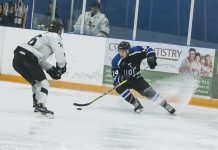“Success is where opportunity meets preparation.”
These words were spoken by Reggie Love, former aide to President Barack Obama, and speaker at the annual Arts Student Union guest speaker event Thursday, Feb. 27 in QNC 2506. The three-hour event featured not only a speech given by Love, but an extensive, interactive Q&A session.
Love, with his charismatic charm, talked about his rise to the White House and answered many policy and political questions from the crowd — ranging from gun control to health care reform, and controversial topics like immigration reform and gay marriage.
The Charlotte, North Carolina native graduated from Duke University with a degree in political science and public policy, while also playing both varsity football and basketball. He was part of an NCAA championship in his freshman year. After he graduated, he played with both the Dallas Cowboys and Green Bay Packers as an outside linebacker in the NFL.
In 2005, Love came to the realization that football wasn’t his true passion. His true passion was basketball.
“Football was kind of miserable. It was something that I didn’t necessarily like to do. I did it because everybody told me it was something I should be doing. You’re tall, you’re fast, and you can catch so you should play football. I was 250 pounds, my stomach was upset all the time, my body hurt, I couldn’t get out of bed, and training camp in the summers was too hot.”
Love discussed his disappointments in not pursuing basketball: “I really, really loved basketball. People ask me what is your biggest regret? I don’t believe in regrets. You make decisions and you make decisions work. One of the few times I did not pursue something I was really passionate about was not continuing to play basketball professionally after college.”
After retiring from football, Love decided to pursue a career in finance. He was highly motivated to work in the sector after witnessing the amount of money his classmates from college were making back in 2005 and 2006.
Love went back to North Carolina and lived with his parents as he began working for Goldman Sachs. He lived at his parents’ house through the holiday season of 2005, when in mid-December while he was golfing, his mom encouraged Love to do something more productive with his time, where he could fulfill his full potential.
Taking his mom’s advice, and realizing he was going nowhere fast at Goldman Sachs, Love sent his resumé to his friend who was the chief of staff at the time for Congressman Patrick Kennedy of Rhode Island.
A week later, he received a call from Peter Rouse, chief of staff for then Senator Barack Obama, who somehow got his hands on Love’s resume, offering him a job as a staff assistant (the position above an intern).
At first, Love was reluctant to work in government because of the perception he had that there were limited opportunities for financial mobility in politics. Due to his hesitation to accept the job, Rouse invited Love to tour Congress (the Senate side), while giving him the opportunity to meet himself and Obama, so that he could make a more informed decision.
When asked why Pete Rouse was so persistent in trying to get Love to join the staff, Love said, “He said he was really interested in meeting and talking to someone who had played for both the Green Bay Packers and Dallas Cowboys. Not many people have that type of experience on their resume.”
During his drive to Washington, where Love took his dad’s car, the former aide experienced what he described as a “miserable nightmare” of a trip. Traffic was horrible, and to top it all off, Love was involved in a car accident.
Once he finally arrived to the capitol, he met both Rouse and Obama before touring the Senate side of Capitol Hill. Love said, “There was this weird energy about it.” He was highlighting the discomfort he felt when he saw the lack of diversity or visible minority represented in Washington.
“There were these buildings and structures … And another thing there wasn’t much diversity. I mean this is a very diverse crowd. If you guys were to walk into the office of a typical Senate staff in 2006 you would be blown away.”
Love correlated his feelings with the lack of diversity he experienced while attending private school: “I went to private school. I hated it, I was the only black kid.”
At the time, Obama was the only black senator in Congress highlighting the issue of diversity and representation of visible minorities in American government. With one senator in Congress, one per cent of the Senate represented 20 per cent of the US population that classify as African-Americans.
Love decided to take the job as a staff assistant that paid $26,000 a year. He saw it as an opportunity to do some public service by working for the only African-American senator.
During his time as staff assistant, Love said, “I really enjoyed it because it felt like a start-up that allowed me to build my brand.”
Ironically, the least “sexy” and “cool” job in the staff office — the mailroom — brought him some worthy recognition that eventually propelled him to his promotion as campaign aide prior to the 2008 election campaign.
Obama’s popularity surged after his keynote speech at the Democratic National Convention in 2004, creating a 12,000 backlog of unanswered mail in the staff office. As relief, Love helped design the first digital mail system in a Senate office, which Rouse praised him for.
In the fall of 2006, Love received a significant promotion within the staff office. Then, as Obama threw his name into the Democratic primaries, Rouse, approached Reggie with a position as Obama’s personal campaign aide or “body man.”
As a body man, he saw firsthand the worst in human bigotry, when it became evident Obama was likely to become the first African-American president of the United States. When asked about some of the emotions that came out of him or the president he said cautiously, “We dealt with it.”
In contrast, Love described the day Obama won the 2008 presidential campaign as “one of the best days of his life.” He realized he was part of a team that made history in one of the most significant ways by breaking the race barrier. In two short years, Obama went from being the only African-American senator in Congress to the first African-American president of the United States.
Travelling and spending basically 24 hours a day with Obama during the 2008 election campaign through to 2011 built an unbreakable bond between Love and Obama. Love said the bond began six months into the primaries in 2007, when Obama bet Love $100 that Tony Parker was a better point guard than Chris Paul.
Their love for sports was what brought them together and built the trust and platform of their friendship. Today, Obama calls Love his “little brother.” The extent of their friendship was evident when Love casually mentioned to the audience that he had dinner with the president this past Tuesday.
The one word to describe Love’s story is “improbable.” Although it seems unlikely many people in life will have the opportunities that Reggie had presented to him, his message of preparation to capitalize on opportunity is an important one for a generation that is facing the prospects of being worse off than their parents’ generation.
Love’s story is both inspiring and motivating, in the sense that it might make an overly pessimistic generation believe in something that resembles an “American dream.”































